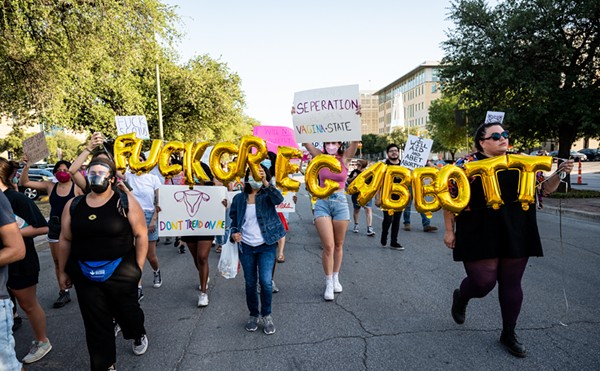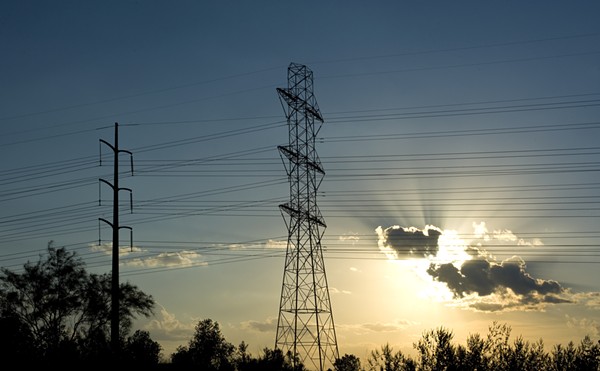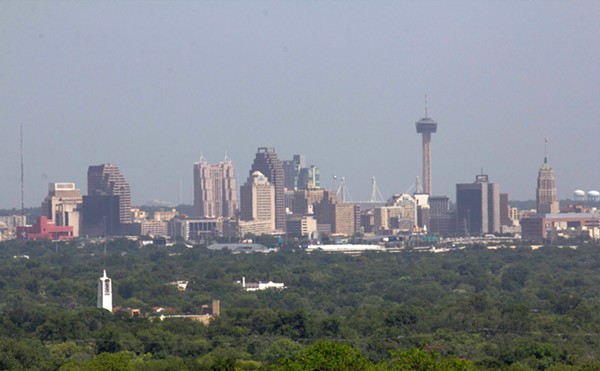
I guess the trouble was we Americans didn't have any self-admitted proletarians. Everyone was a temporarily embarrassed millionaire." — John Steinbeck, A Primer on the 30s
Cutting Texans' exorbitant property taxes has emerged as the atypically bipartisan watchword of the governor's race. Both Democratic contender Beto O'Rourke and incumbent Republican Gov. Greg Abbott are promising voters much-hankered-for relief.
"Ad valorem" is an old Latin term meaning "according to what your shit's worth," and when the appraised value of your shitty home abruptly skyrockets, so does your shitty ad valorem tax bill.
For some reason unknown to the four U.S. Supreme Court justices who dissented in 1973's precedent-setting San Antonio Independent School District v. Rodriquez case, Texas chose to draw the bulk of its local school funding from taxes on nearby properties. That's great if you happen to live next to multimillion dollar real estate. It's less than great if you live in Section 8 housing. To the five justices in the majority, the Equal Protection Clause was an old American term meaning "you're on your own."
Half a century later, Texas still doesn't have a progressive income tax, and wealth-guarding governors are still campaigning on the plight of the beleaguered taxpayer. Voters are well within their rights to ask an embarrassingly obvious question: why didn't Abbott fix this during his seven years presiding over a state with one-party Republican rule?
Maybe because not fixing the problem allows the GOP to sing its favorite tune whenever there's a budget surplus around election time: "This is your money; you should decide how best to spend it." Except, dearest leaders, we chose to give you that money so you could keep the lights on, keep the air and water clean and keep the schoolchildren semi-literate and semi-cognizant of U.S. history.
Abbott's flawless reasoning appears to have trickled down to our own San Antonio City Council, which recently decided to give the average CPS Energy customer back a whopping $29 on their next electric bill instead of, say, investing those aggregated tens of millions of dollars into weatherization, which would save us many-fold that paltry rebate down the road. Bexar County's 40 largest corporations, however, will make off with around $100,000 a piece.
To gauge the exact length and breadth of the shaft, Texas can expect twice as many days of 100-degree-plus heat by the year 2036, according to the climate risk assessment database Heat Factor, set up by a former executive at the Weather Channel. Apparently, economic forecasts can appear much brighter if you don't factor in sustainability.
But at least we can console ourselves in knowing we're better off tax-wise than the People's Republic of California, right? RIGHT?
Nope.
As pesky facts would have it, the high property and regressive sales taxes Texans fork over mean that all but the luckiest of us pay a higher effective tax rate than Californians do. If your household earns less than $55,000 a year, for example, more than 10% of what you make heads to the state capitol. If you're in the richest 1%, only 3% does. That must be what Texas Republicans mean by "tax fairness."
California Gov. Gavin Newsom gleefully gloated as much during his appearance at the Texas Tribune Festival in Austin earlier this month. "Your bills are higher in Texas than they are in California for residential electricity," he even added to rub things in.
Texans pay $154, while Californians pay $123, according to a recent analysis by financial site WalletHub.
While California has experienced zero blackouts in 2021 and 2022, six of Texas' power plants shut down thanks to extreme heat in May. And the Texas freeze in February of last year exacted nearly $200 billion in damage and killed hundreds. Renewable energy sources including wind and solar saved us from far worse disaster.
Now, it's true that when the world's most popular podcaster, Joe Rogan, moved from Los Angeles to Austin, he saved an estimated $13 million on his state taxes. And Rogan's compadre in pandemic misinformation, Elon Musk, saved at least $1.1 billion with his recent move to the Lone Star State. That surely buys a lot of awkwardly fitting cowboy hats.
But that's them — not most readers of this column. And if you'd enjoy wiping that annoying smirk off Gavin Newsom's face as much as I would, remember that you and I, Rogan and Musk, each get one ballot this November.
"It is difficult to believe that if the children of Texas had a free choice, they would choose to be educated in districts with fewer resources," Justice Thurgood Marshall wrote in his dissent to the San Antonio Independent School District v. Rodriquez case. "That a child forced to attend an underfunded school with poorer physical facilities, less experienced teachers, larger classes, and a narrower range of courses than a school with substantially more funds may nevertheless excel is to the credit of the child, not the State. Indeed, who can ever measure for such a child the opportunities lost and the talents wasted for want of a broader, more enriched education?"
In terms of opportunity costs, imagine how different a country this would be if funding schools with property taxes had been ruled unconstitutional 49 years ago and low- and middle-income students had significantly more material advantages with which to flourish.
Or if, 28 years ago, Democrat Ann Richards hadn't lost the Texas governorship to Republican George W. Bush, whom five justices saw fit to appoint as president, leaving catastrophes in his wake from the Middle East to New Orleans.
Let's not allow our failure to elect Beto O'Rourke become a similarly consequential regret in retrospect.
Stay on top of San Antonio news and views. Sign up for our Weekly Headlines Newsletter.















